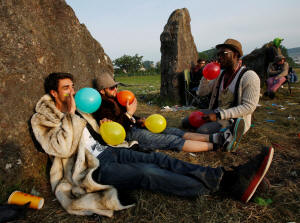Ballooning use of laughing gas in Europe is no joke, drugs agency says
 Send a link to a friend
Send a link to a friend
 [November 22, 2022]
LISBON (Reuters) - The recreational use of nitrous oxide, also
known as "laughing gas", is on the rise in Europe among young people,
producing worrying numbers of poisonings, the European Union drugs
monitoring agency EMCDDA said in a study. [November 22, 2022]
LISBON (Reuters) - The recreational use of nitrous oxide, also
known as "laughing gas", is on the rise in Europe among young people,
producing worrying numbers of poisonings, the European Union drugs
monitoring agency EMCDDA said in a study.
The growing popularity of the substance, which causes a feeling of
euphoria, relaxation and dissociation from reality, stems from its wide
over-the-counter availability, low price, ease of use and the false
perception that it is safe, the Lisbon-based agency said.
It has a legitimate wide range of medical, industrial and commercial
uses, particularly as propellant in whipped cream dispensers or water
siphons for which purpose it is sold in compact, inexpensive cartridges
online or in supermarkets.
In some European countries, particular concerns have been raised since
2017, when larger cylinders of the gas that deliberately target the
recreational market appeared, often luring teenagers inexperienced with
drug use.
The cartridges are normally consumed by filling party balloons, from
which the gas is then inhaled, but more recently users have been
inhaling directly from dispensers or cartridges, which poses a high risk
of severe cold burns and lung injury.

[to top of second column]
|

Festival goers inhale laughing gas at
sunrise at the stone circle on the second day of Glastonbury music
festival at Worthy Farm in Somerset, June 27, 2013. REUTERS/Olivia
Harris/File Photo
 It also affects several brain and
spinal cord networks.
In Denmark, cases of nitrous oxide poisoning have
increased from 16 in 2015 to 73 last year, in France cases jumped to
134 in 2020 from 10 reported in 2017, and the Netherlands had 144
cases in 2020 and reported a sharp rise in car accidents caused by
driving while intoxicated or trying to fill balloons.
In the United Kingdom, nitrous oxide is the second most prevalent
drug among young adults aged 16 to 24 years, after cannabis, the
EMCDDA said.
In order to control the use of the gas, it proposes reducing the
size of packages, banning sales to those under 18 or during night
hours when party-goers tend to buy it.
(Reporting by Patricia Vicente Rua; Editing by Andrei Khalip and
Tomasz Janowski)
[© 2022 Thomson Reuters. All rights
reserved.] This material may not be published,
broadcast, rewritten or redistributed.
Thompson Reuters is solely responsible for this content. |